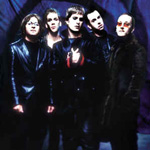
The CDNOW Interview with Matchbox Twenty's Rob Thomas includes exclusive audio clips. If you have Windows Media Player, click on the link below each question to hear Thomas' answer.
If the sophomore slump does indeed exist, then someone forgot to tell Matchbox Twenty. The group scored several hit singles with its 1996 multi-platinum debut, Yourself or Someone Like You. Their sophomore effort, released earlier this summer, and aptly titled Mad Season, is even stronger.
Conventional wisdom holds that a four-year stretch between albums is a commercial kiss of death, but thanks to incessant touring, as well as frontman Rob Thomas's star turn as co-writer and singer on Santana's triple-Grammy winning smash "Smooth," Matchbox Twenty's popularity continues to soar. In fact, if Mad Season's chart-topping first single, "Bent," is any indication, the CD could be on its way to even stronger sales than its predecessor.
 |
Recently, Thomas spoke with CDNOW about his songwriting, his childhood, and the ephemeral nature of pop stardom.
CDNOW: Were you surprised at the extent to which "Smooth" raised your profile as a songwriter, as opposed to simply being the frontman for a pop band?
Rob Thomas: [Listen to the answer] I really appreciated it. It's so nice to see "songwriter" under your name anywhere, as opposed to "pop star." It was funny. We had sold 10 million records, and I thought, "This can't get any weirder; life couldn't possibly get any more odd." And then "Smooth" came along, and everything got really odd.
Following the song's success, was there any pressure put upon you to make a solo album?
[Listen to the answer] No. A lot of people asked about it, but it never really crossed my mind. I write a song; my function so far for the band has been the principal songwriter. But to make an album, the sound of that album depends on the people you make that album with. I feel really connected with the people I work with. As a band, we're a family, so it never really crossed my mind [to do a solo album].
What are some of the difficulties inherent in making a second album, after having had such a successful first one?
[Listen to the answer] I don't think that there are any that're really different. I think you yourself are in a different situation regardless, and you know a little more. If anything, all the climates seem to point toward a better atmosphere. Everybody's a lot more comfortable together, and everybody's a lot more comfortable on their instruments. Everybody's spent all this time after being on the road, soaking up all these different influences and wanting somewhere to drop them off. You get back in [the studio], and there's all this excitement around it.
When you were putting together the horn sections and orchestration on the new album, how concerned were you about how you were going to perform the songs live?
[Listen to the answer] You know, we really weren't [concerned about that] at all. Paul, our drummer, used to say that he wanted to make a record that we couldn't possibly play live, and then go and play it live. But we don't worry about it; we just go figure it out [later]. That's why, before this club tour that we just did, there was a long process of just sitting around and sussing it out, and figuring out what we needed to do to make it sound as close as possible to the record, with just the six of us.
Your childhood had its share of difficult periods, particularly after you dropped out of school and were homeless for a while. Do you think those experiences have found their way into your songwriting?
[Listen to the answer] When you're still young, things are still going easy into your head and staying there. When you're 16 or 17 ... you don't block off as much as you do when you get older. So the fact that I was that age, and hitchhiking around the South, and kind of finding my own place to stay, sometimes ... it was this freedom that, at the time, I didn't see as a bad thing. I thought it was kind of fun. I was 17, and I could do whatever the hell I wanted. But I think something like that gives you character, and gives you a perspective on life that maybe you wouldn't have if you'd taken more conventional routes.
 |
Was there a transition in your life where you went from aspiring to be a famous pop star figure to wanting to be as good a songwriter as you could possibly be?
[Listen to the answer] I think that happened somewhere in the middle of [making] the first record. You start to realize things that you think are important, and you realize you want to follow in the footsteps of the people you've admired. You don't want to be part of a circus, and you don't want to do anything that's greedy for just the "celebrity" of things. I think people are smart, and they can see that. It's better to keep your head down. You're just in a band; it's not such a big deal.
Do you feel like you have a good sense of what makes for a hit single?
[Listen to the answer] No, I have no idea. It's hard for your own music, because you just kind of like it all. And when you think about all the songs you love that aren't singles, that aren't doing great, you're like, "I don't get it." Obviously, I don't know. If I had my way, "Blue," by the Jayhawks, would have been a huge hit.
You've sometimes described Matchbox Twenty's music as being "middle-of-the-road," as opposed to cool or fashionable.
Fashionable is a good term. I do think we're cool [laughs].
Do you think middle-of-the-road is a good place to be?
[Listen to the answer] I'm happy with our middle-of-the-road status. I think a lot of our stuff is about describing emotions. We're not using our band as a soapbox, or as our way to hook into any certain member of the disenfranchised. We're there for people who want to hear new songs. That's what we do.